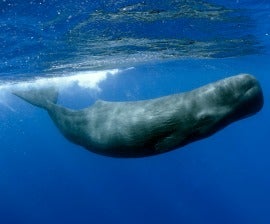-

Douglas Hoffman/www.douglasjhoffman.com
FLORIANÓPOLIS, Brazil—The following is Humane Society International’s opening statement at the start of the 67th meeting of the International Whaling Commission:
The International Whaling Commission, like the International Convention on the Regulation of Whaling, which established it, was born in a moment of understanding and acknowledgment concerning the heavy toll commercial whaling had taken on cetacean populations worldwide. The Commission’s charge has always been a difficult one, and it has become complicated still more by changing attitudes toward whales and whaling, the expansion of our knowledge of whales, and our assessment of threats to their survival.
In 1946, there were few who questioned whaling’s legitimacy, so it was appropriate to forge an international agreement on its regulation. However, even then, the Convention gave equal emphasis to whale conservation, well before such thinking became the norm. This was a remarkable instance of foresight given its origins, and it has made all the difference.
Today, three quarters of a century later, conservation is the norm, and the Commission’s adoption of a global moratorium on commercial whaling, which has spared tens of thousands of whales, is widely and justly regarded as a great success. Whatever the case may have been in 1946, most of the world now believes that whaling should be reserved for rare and specialized circumstances—specifically as aboriginal subsistence whaling where genuine human needs are at stake. There is nearly universal consensus worldwide that commercial whaling is biologically and economically unsustainable, that it causes unacceptable suffering, and that whales deserve the fullest possible protection.
Some thirty years after its adoption, the commercial whaling moratorium is the baseline for global deliberations concerning whales. In our view, the IWC should not consider or adopt any proposal that forfeits the enormous gains wrought by the commercial whaling moratorium. In good faith, we would ask those few countries still whaling to respect the judgment of the community of nations, and of history, that the moratorium has been and remains the best conservation tool ever enacted to ensure the recovery of whale populations and to prevent their future decline.
In light of its historic impact, the continuing efforts of some nations to undermine the moratorium within the Commission itself have come to seem ever more cynical. Criticism of the Commission as dysfunctional, proposals to change the Schedule to permit commercial whaling, campaigns for the recognition of a new form of whaling, Small Type Coastal Whaling, demands that amount to an expansion and commercialization of aboriginal subsistence whaling quotas, refusal to respect existing sanctuaries or create new ones, and continued whaling under exemption by several member nations — all of these, in their way — represent attacks on the integrity of the Commission and the ICRW.
Take action now to help whales.
These actions constitute both a distraction and an impediment to the IWC’s urgent work of ensuring the further recovery and good health of whale populations across the planet. Over the last few decades, the Commission has advanced a large and expanding agenda of work to better understand and mitigate threats to cetaceans in our increasingly degraded global oceans. Those threats include the other human-induced impacts on whale survival — pollution and degradation of habitat, emerging diseases, marine noise, ship strikes, and entanglement in fishing gear. With these hazards increasing each year, it would be irresponsible of the Commission to do anything other than strengthen its ban on commercial whaling.
Especially in light of what we are learning about the probable course of global climate change, the IWC and its members have a collective obligation to take a precautionary approach. Never have we been so clearly in need of the goodwill of the whaling countries. Never before have we so needed their commitment to the commercial whaling moratorium. Never before has it been so incumbent on the IWC’s member nations to work together to help secure the greatest possible protection for cetaceans, and make the oceans a safer place for them to live.
We are proud to attend the IWC to observe and assist in advancing its urgent, essential and effective work on cetacean conservation and welfare. It is clear to us, and to the more than 100,000 people from many countries worldwide who signed the pledge below, in just 14 days, that this future-focused agenda of stewardship is what the world expects of the IWC:
“I believe that commercial whaling is cruel, unnecessary and irresponsible. I stand with Humane Society International in urging all countries that are members of the IWC to oppose Japan’s proposals to bring back commercial whaling. Whales already face so many threats, a return to commercial whaling is the last thing they need.”
END
MEDIA CONTACT: Wendy Higgins, Director of International Media, HSI/UK, whiggins@hsi.org
